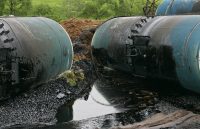4 Extra Chemical Reporting Tips for Waste Facilities
The EPA claims that there are sufficient regulatory reasons for TSDFs to be in contact with local authorities concerning emergency procedures. The Agency points to 40 CFR 264.30 to 264.37 and 40 CFR 265.30 to 265.37, the requirements that TSDFs develop preparedness and prevention plans, and specifically 40 CFR 264.37 and 40 CFR 265.37, where […]










